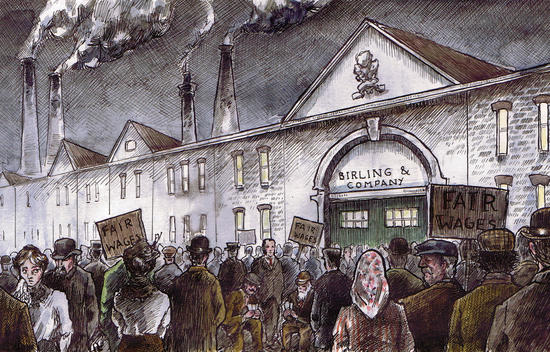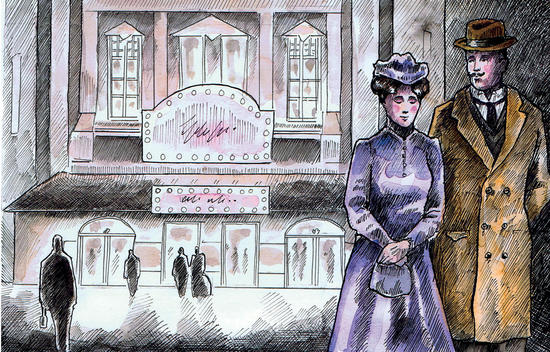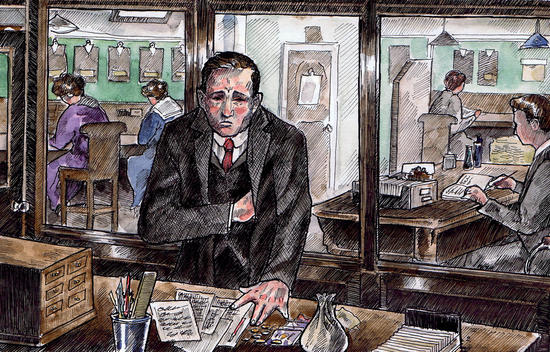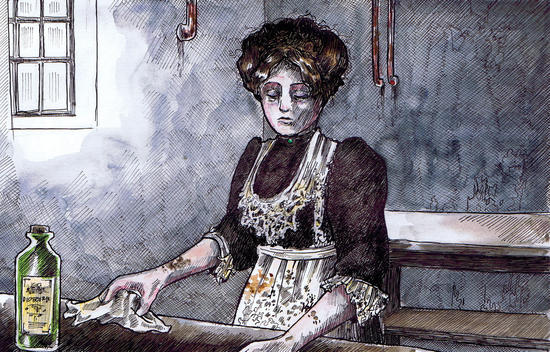Love (/lʌv/) - feel deep affection for (someone)
"Chain of Events"
All the members of the Birling family and Gerald all have a part to play in the suicide of Eva Smith. Although a suicide is more of a personal decision, the audience cannot blame Eva herself for this suicide. The inspector describes it as a "chain of events" proving that every situation the Birling's put her in all contributed to her suicide. However there is a lot of debate over who was the most to blame, and it's difficult to pinpoint on one specific character. Of course some affected Eva more than others.
Arthur
- Refused Eva's request for a pay rise
- Fired her because "The girl had been causing trouble in the works"
- We can also partly blame Arthur for Eric's behaviour because he didn't raise Eric like a father should. - "Because you're not the kind of father a chap could go to when he's in trouble, that's why"
- He is obsessed with business and doesn't care about relationships or emotions.
- Audience may despise Arthur because "Still, I can't accept any responsibility"
- This affected her death because she was mistreated as a member of the working class and was left without a job.
Sheila
- Gets jealous that Eva looks better in the hat than she did, and didn't like her laughing at her. "Because I was in a furious temper"
- Is portrayed as stuck up because she got her fired from anger 'in the moment'
- Caused her to lose her job meaning no money for food or house.
- Can't blame Sheila as much because she accepts responsibility. "I behaved badly too."
- This affected the death because it left her homeless and penniless.

Gerald
- Takes Eva/Daisy in when she didn't have a home.
- Offered her food when she was starved. "I didn't ask for anything in return"
- She loved him and he loved her "for a time" "I suppose it was inevitable"
- Went away on business and broke off the relationship.
- Doesn't want to take any responsibility even though he abused her vulnerability. "She didn't blame me at all"
- She loved him and went to the seaside after they broke up "just to make it last longer" because she had never felt as happy in her life other than when she was with him. Love is a feeling that cannot be helped. All of the other scenarios had other potential outcomes, however she can't control her feelings.
- This could have had the most impact on her suicide because after feeling the way she did with Gerald, she never got to experience that feeling again.
- Got Eva pregnant
- Offered to support her by giving her money, but there came a point where "She wouldn't take any more"
- He is an alcoholic. Alcohol does serious damage to the brain, especially to someone as young as Eric. The audience may sympathise with him because of his state at such a young age.
- Eva was a prostitute at this time, it almost seems inevitable that something like getting pregnant was going to occur at some point.
- Not having the same connection with Eric as she did with Gerald may have affected her hopefulness of ever finding a relationship like that again. "I wasn't in love with her or anything"
- He still accepts responsibility.
- This could have had the most impact on Eva/Daisy because being pregnant without a home or food may have lead her to kill herself as a mercy killing; it would have been best for her and the baby. Also, pregnancy affects the hormones in the body, so being pregnant could have made her feeling the worst she's ever felt - especially when being in the situation she was in.
- Sybil was Eva's last hope
- Eva came to Sybil for help under the name of Mrs Birling, which the audience can admit was not the best impression to give to Mrs Birling. "- and naturally that was one of the things that prejudiced me against her case"
- She didn't accept her class and didn't accept responsibility for her death. "...she had only herself to blame" "I didn't like her manner"
- Sybil blamed the father and said the father should support her, even though she runs a charity to serve the purpose of helping people in situations such as Eva's. "...it was her business to make him (the father) responsible"
- This contributed to her suicide because Sybil had the power to help but chose not to because of her prejudgment of her.
From this analysis, in my opinion, I think that Gerald was most to blame because he was the only character out of the 'suspects' that had a proper relationship with Eva. However, another factor that must be considered is that we don't know exactly how Eva felt after each scenario took place. For all the audience knows, there could have been something that happened after she was involved with the Birling's. Moreover, Gerald suggests that everyone was shown different pictures, so they were all shown different girls. However, theres something about the inspector that is quite supernatural, this can either strengthen or weaken how convinced the audience is; they either trust the inspector or they don't. This also reflects the characters opinion of Goole - Sheila and Eric were on his side, but practically the rest were against him.
I could imagine the audience to be unsure about the inspector and how trustworthy he is, and who is most to blame is a subjective opinion. In my opinion, that is what makes Priestley's play so interesting; he's testing the morality of not only the characters, but the audience simultaneously. Moreover, it has the potential of altering peoples morality for the good. We see that Arthur's attitude, for example, towards the situation seemed very arrogant and selfish. Either the audience can agree and relate with Arthur, but in the best circumstance, members of the audience may realise that in fact, that's how they would have reacted if being put in that same situation. However,after watching that behaviour before their eyes, they might come to the realisation that that is not the righteous way to react.
Although An Inspector Calls seems like quite a simplistic plot, with reading between the lines comes Priestley's attitude on how he wanted to effectively improve the society he lived in.






Comments
Post a Comment